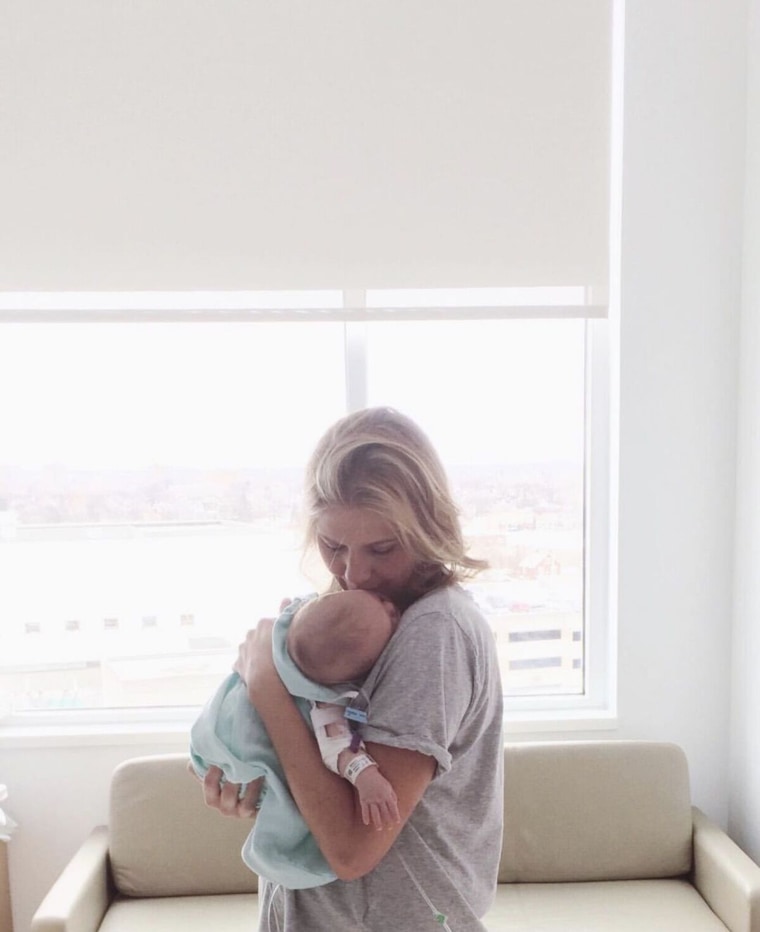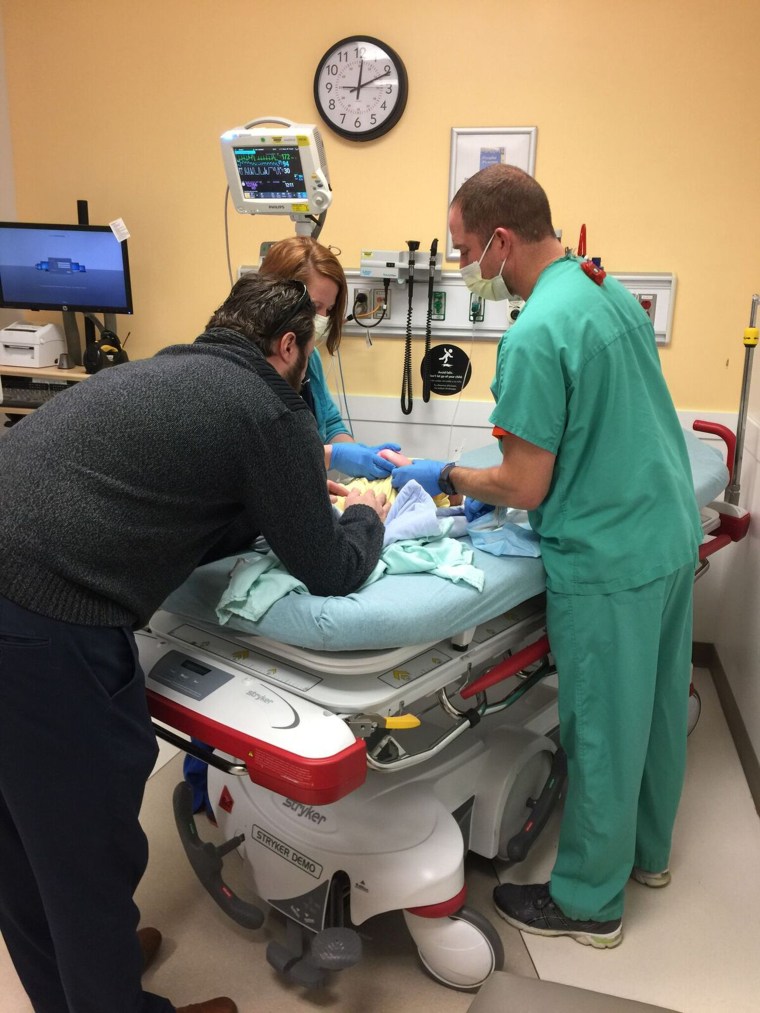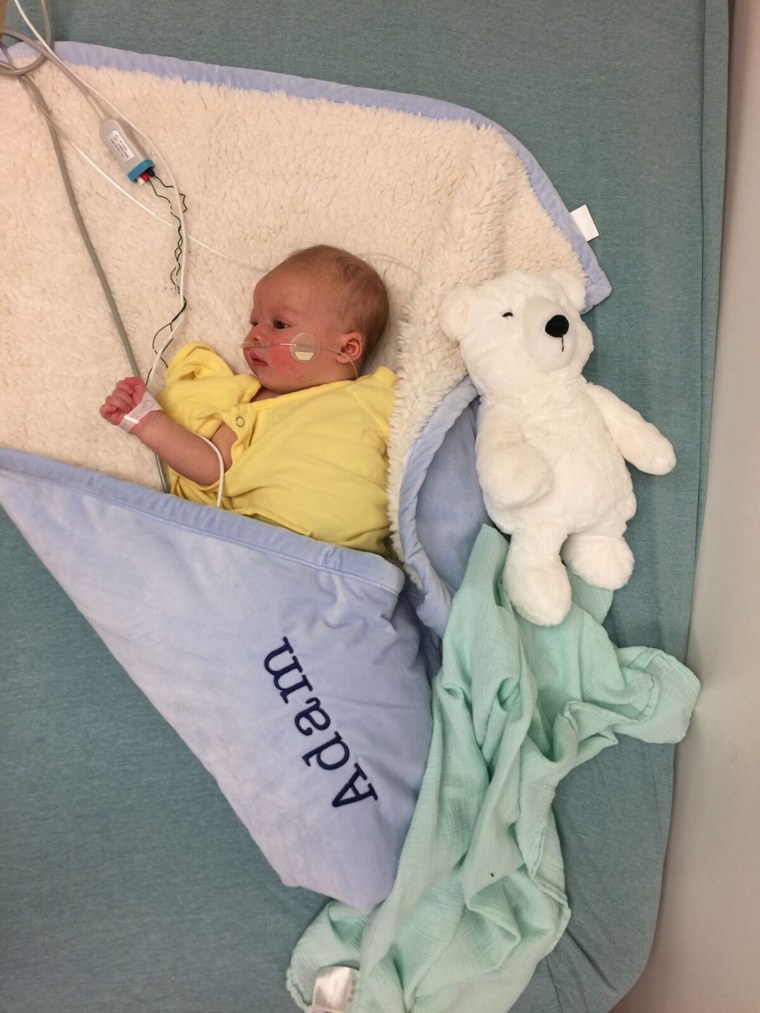Most people have not heard of respiratory syncytial virus, or RSV, but if you're caring for infants or the elderly this time of year, it's a bug to be aware of: it's common and it can be deadly.
A couple in Metairie, Louisiana, is speaking out about the infection after their 14-month-old daughter spent three days in the ICU due to pneumonia, adenovirus and RSV.
"Out of the 19 rooms they had in ICU, about nine had children positive with RSV," the mom told WWL-TV, her local news station. Her daughter's condition improved and the family was happy to be back home for the holidays.
Shanisty Ireland had a similar experience nearly two years ago when her newborn son suddenly became very ill. Her oldest children Luke and Eden kept passing illnesses back and forth. The constant coughing, sneezing and slight fevers were exhausting. At first, she thought her 5-week old son, Adam, was protected from the infections because he was breastfeeding. But suddenly, his condition became increasingly worse.
“He threw up on my dad. It wasn’t just spit up,” Ireland, 35, of Columbus, Ohio, told TODAY. “He wasn’t opening his eyes and he was really starting to have that labored breathing. His head was bobbing; you could see his rib cage when he sucked in.”

Panicked, she rushed Adam to the pediatrician. A nose swab revealed Adam had respiratory syncytial virus, or RSV. For most children, that simply means mild cold-like symptoms for about a week. That's what Ireland thought it was when the doctor sent them home.
But after a few days, Adam was sicker, developing a fever and other alarming symptoms.
“He didn’t have a wet diaper and he wasn’t eating at all,” she said.
The pediatrician urged her to take the baby to the emergency room.
“Everybody who was working with him and speaking to me was dressed head to toe in masks. I was thinking, ‘I still don’t even know what RSV is,’” Ireland said. “It was very scary, especially because his fever started spiking.”

Adam received IV fluids, nose aspirations and breathing treatments. Doctors said the infant needed to stay in the hospital until his health improved.
“It was terrifying,” Ireland said.
What is RSV?
While not well known, RSV is a viral infection that appears commonly from October to April each year.
“Respiratory syncytial virus is one of the more frequent viruses that all of us can suffer from,” said Dr. Octavio Ramilo, chief of infectious diseases at Nationwide’s Children Hospital in Columbus, Ohio.
Almost all children catch RSV before they turn 2, but for most, it's a mild respiratory illness, according to the Centers for Disease Control and Prevention.
The body doesn’t develop antibodies against RSV, which means people can have it multiple times in their lives. In older children and adults, RSV leads to sneezing, coughing, runny noses, much like a common cold. Most people feel better in about a week. But in some infants, RSV can be deadly.
“Three, 4 percent, they get so sick that they need oxygen,” Ramilo said.
It's unclear why RSV is so serious for some children, though it more severely affects babies born prematurely, babies with asthma or chronic lung conditions, or babies under 6 months old. RSV starts with “a runny nose, mild cold.” By the third or fourth day, some infants struggle to breathe, lose their appetite and run a fever.
"The symptoms start very mild and all of a sudden they escalate and parents might get surprised by it," said Dr. Fariba Rezaee, a pediatric pulmonologist at Cleveland Clinic, who did not treat Adam.

RSV symptoms:
Rezaee said parents should seek help if their child:
- Develops a fever
- Is under 3 months old
- Wheezes
- Struggles to breathe or belly breathes
- Has a cough that does not improve over time
"Wheezing, shortness of breath, those are the symptoms to right away seek help for," she said.
Ramilo is researching a possible vaccine for RSV. It is challenging because the vaccine needs to be attenuated so it doesn’t cause the illness, but strong enough to produce antibodies for the body to defend itself. His group has been using blood samples from babies like Adam to better understand how RSV acts in the body.
“It is not an easy process. It requires a lot of testing,” he said.

There's no treatment specifically for RSV. Most of the medicines simply quell the symptoms, which is why "prevention is really important," said Rezaee.
To prevent spread of infection:
- Wash hands for at least 20 seconds.
- Cover mouth when coughing or sneezing.
- Avoid crowded places during cold season.
- Clean off surfaces, such as counters or door knobs (the virus survives for a few hours on surfaces).
- Refrain from touching nose, eyes, and mouth.
Adam recovered after four days in Nationwide Children’s Hospital. Ireland shared his story to help others learn more about RSV.
“I didn’t recognize how serious it was until it was almost too late,” Ireland said. “RSV can hit any child and any person at any given time. I would really love for people to understand that and know what the signs are.”